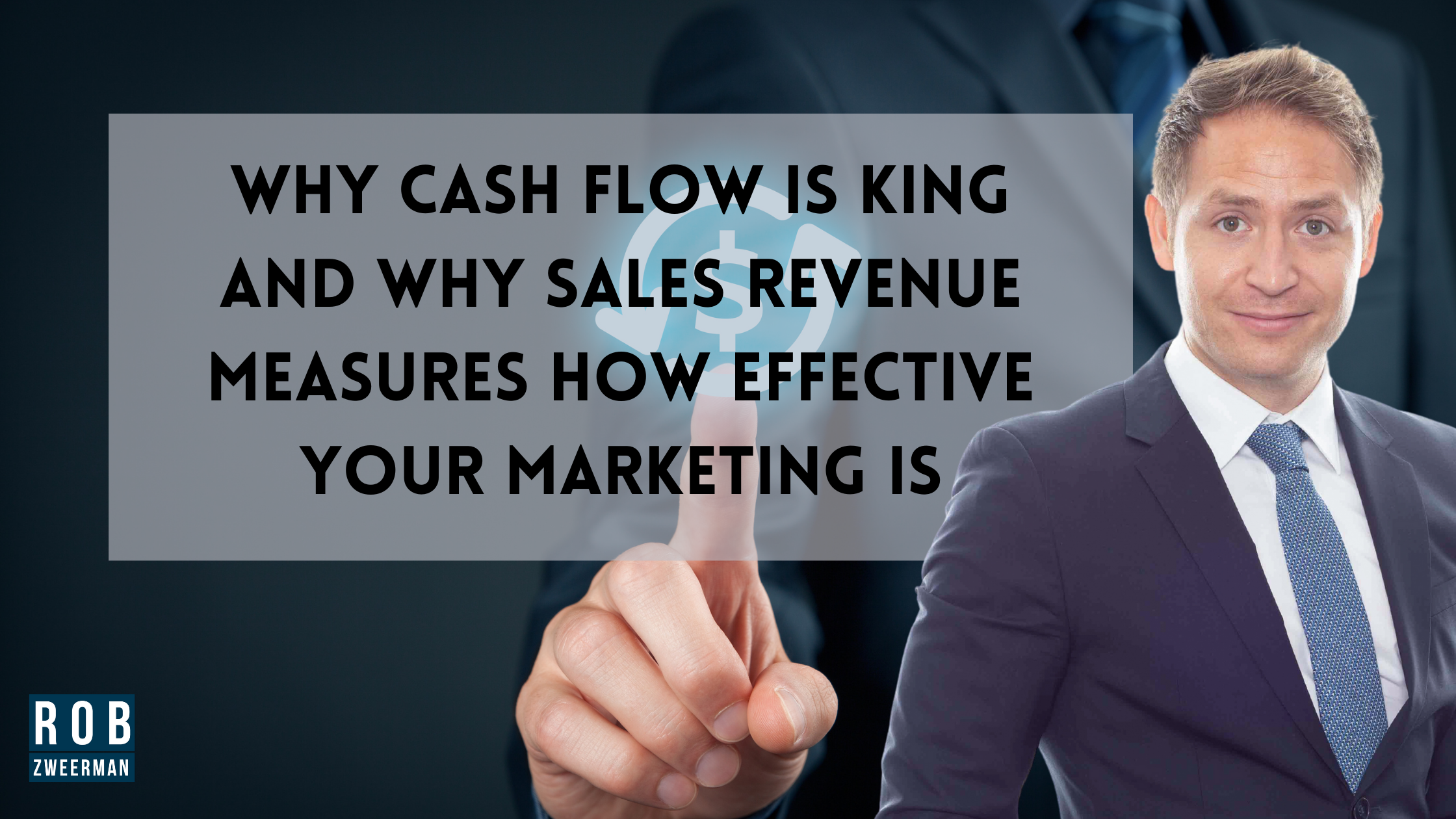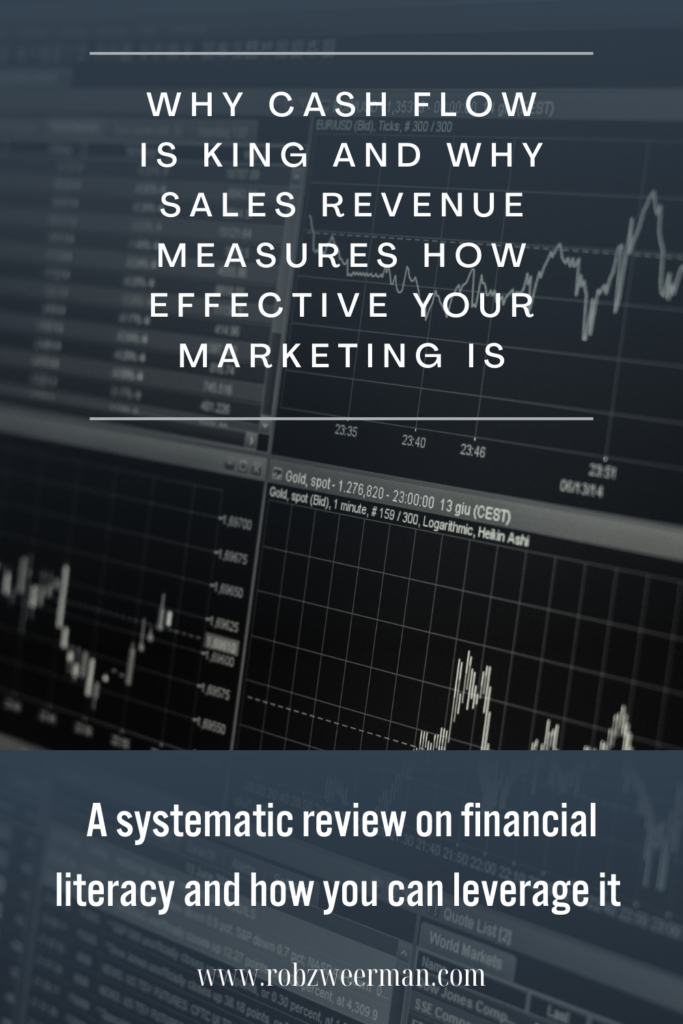Why Cash Flow is King and Why Sales Revenue Measures How Effective Your Marketing is

Why Cash Flow is King and Why Sales Revenue Measures How Effective Your Marketing is
How understanding these concepts can make or break you
We’re in the middle of a pandemic, and a lot of small businesses are struggling. No matter whether your business is struggling or having experts helping with finances – understanding the principle behind cashflow yourself is crucial.
Developing a concrete strategy and being familiar, especially in an economic crisis, is essential. Gaining financial literacy has never been more critical than ever. It can prevent you from having an unwanted surprise later on because you only focused on the revenue rather than the cash flow.
The difference between cash flow and revenue
In order to develop a strategy, you have first to understand the difference between cash flow and revenue because they’re often confused. Cash flow is a broad term describing net income, meaning how much money you actually have coming in vs. your expenses. Hereby, you’re not counting it until you received the check (all income, no matter the source) – significant difference to profit, which also counts future income within that period. Revenue only describes income from sales precisely without taking expenses into account or whether the payment was already made.
Example:
You’ve made a revenue of $80,000 off of one of your services that you sold, but you’ve only been paid $60,000 of it (still waiting on the payment of the rest). Overall, your business generated a total of $20,000 profit after $10,000 in expenses; however, you still have $10,000 outstanding balance that needs to be paid – making your cashflow only $10,000 after expenses.
Counting potential income is what is often the downfall of many businesses.

There are ways to project cash flow, which is essential, especially in fluid and fast paced businesses that deal with vendors, such as restaurants or shops.
1. What is your current account balance? This also includes currencies and coins.
2. List any anticipated inflows and the date it’s coming in – payments, interest or investments, sales, etc.
3. List any anticipated outflows and the date as well – payrolls, debt, taxes, future investments, inventory, services, contractors, etc.
Keeping a spreadsheet with an overview will help project potential problems if the cashflow sinks under $0. This can help to save your business before it’s too late; it can also help plan your finances for potential future purchases.
My advice: prepare for the worst.
Be more thoughtful and estimate your inflows lower while your outflows higher. Similar with payment dates, estimate your inflows earlier while the outflows later. This will prevent a bad surprise.
This system will allow you to predict the future and, therefore, to take action earlier – especially in a struggling economy like in a pandemic.
If you’re still unsure about your Revenue Vs. Cashflow, enroll into my free investment master class, where I go deeper into these methods to develop and improve your cash flow strategy.
The differences make sense, but why does it matter so much? Let me explain. Think of it this way: most businesses generate revenue as they have sales – but only theoretically, since the payments often aren’t collected right away.
Supermarkets and vendors generate revenue from restaurants; however, the goods aren’t paid for yet as the customer hasn’t bought them yet. Customers often pay with a credit card; therefore, the money takes longer to make it to the restaurant and even longer to make it to the vendor’s bank account.
That’s if the business only survives on revenue; if you live on cash flow, you will have enough liquidly not to have to worry about a fluctuating economy. Since every business is different and has different needs, the cashflow systems will vary. However, once you have your strategy and know your numbers, you’re able to make reliable predictions.

While it’s essential to have a positive financial mindset, I recommend leveraging the power of negative preparations. This means you’re asking yourself questions to prepare for the worst: Think of what you don’t know or what could be the worst-case scenario?
Be one step ahead of the game.
You might ask yourself why everyone is still talking about revenue if cashflow is the one that’s actually showing your success. You’re not wrong; however, this doesn’t mean that revenue is not useful. In fact, it actually predicts how strong your marketing campaigns are.
As I mentioned before, when speaking about revenue, you’re only looking at the money generated from sales. Most sales come from marketing, as this is how your audience gets exposed to your products and you (the brand).
Not sure how to forecast this for your business? Set up an alignment call with me or my team to get clarity on how to implement this type of thinking into your business.
Your revenue shows you how effective your marketing is.
But since it takes time for marketing to be leveraged as a useful tool, you might not see a high number of revenue for a while. So, how can you increase your cash flow?
While you’re leveraging marketing, actively work towards attracting new clients. This could mean looking in new niches or markets you need to familiarize yourself with. Where does your ideal client – your audience – spend their time? Whether it’s locally or virtually, think about your audiences’ interests in order to find them.
You are having your products being digital means that you’re saving on overstock. This benefits your expenses and, therefore, cashflow.

Another strategy you could consider is sharing “early releases” within your programs if you’re a coaching or consulting business. Your courses might not be fully ready; however, having an early release can trigger reactions by your audience. Depending on your immediate need for cash, you could offer a payment plan if your customers cannot pay the full price.
Not only would it help you if you’re in need, but it also shows loyalty and care towards your customers. It shows that you want to help them and care enough to invent new initiatives to serve your followers.
If you are unsure of how to offer an early release, I have a dedicated training every Sunday called Sunday Study Power Hour. Where I teach how to shape your vision and double down on your money producing activities.
Implement some of these crisis-proof habits and gain financial literacy. Starting a business is easy but keeping ahead of possible downfalls isn’t. I hope this helped you and shifted your perspective. While it’s essential to have financial advisors and experts on your team, you need to understand your business finances to run and manage it effectively.
While you now understand the differences between cash flow, profit, and revenue – leverage my complimentary 7-day free trial coaching program. Apply, so my team and I will consider coaching you and develop a cash flow strategy to enhance your business, so you know exactly where you stand.
Read more on how to close deals instead of just relying on sales: Why only a Closer Can Seal the Deal.
Reading more on Why Sales is the Livelihood of a Business to up your conversion rates.
Do you have a cash flow strategy in your business? If you do, share below what has worked in your business…
ABOUT THE AUTHOR

Team Rob N. Zweerman
Rob Zweerman has been sharing his expertise on how to achieve financial well-being through his online webinars, podcast, training events, coaching and mastermind programs. He is the founder of various media and education companies. Rob Zweerman continuously seeks out to elevate his own performance by surrounding himself with the industry’s best teachers and mentors that in turn, drives the results of his clients.

Choose a skill to Master
Introducing Wealth Building Courses Taught by World-Class Practitioners
Explore Course





